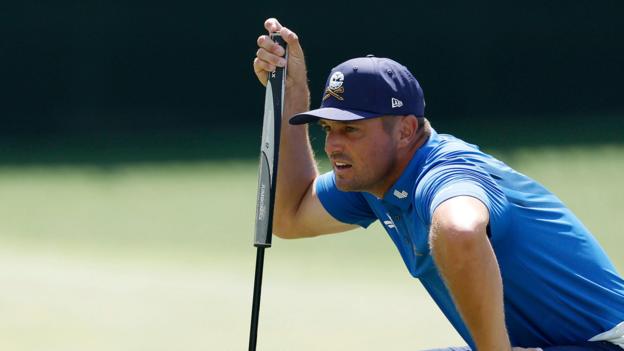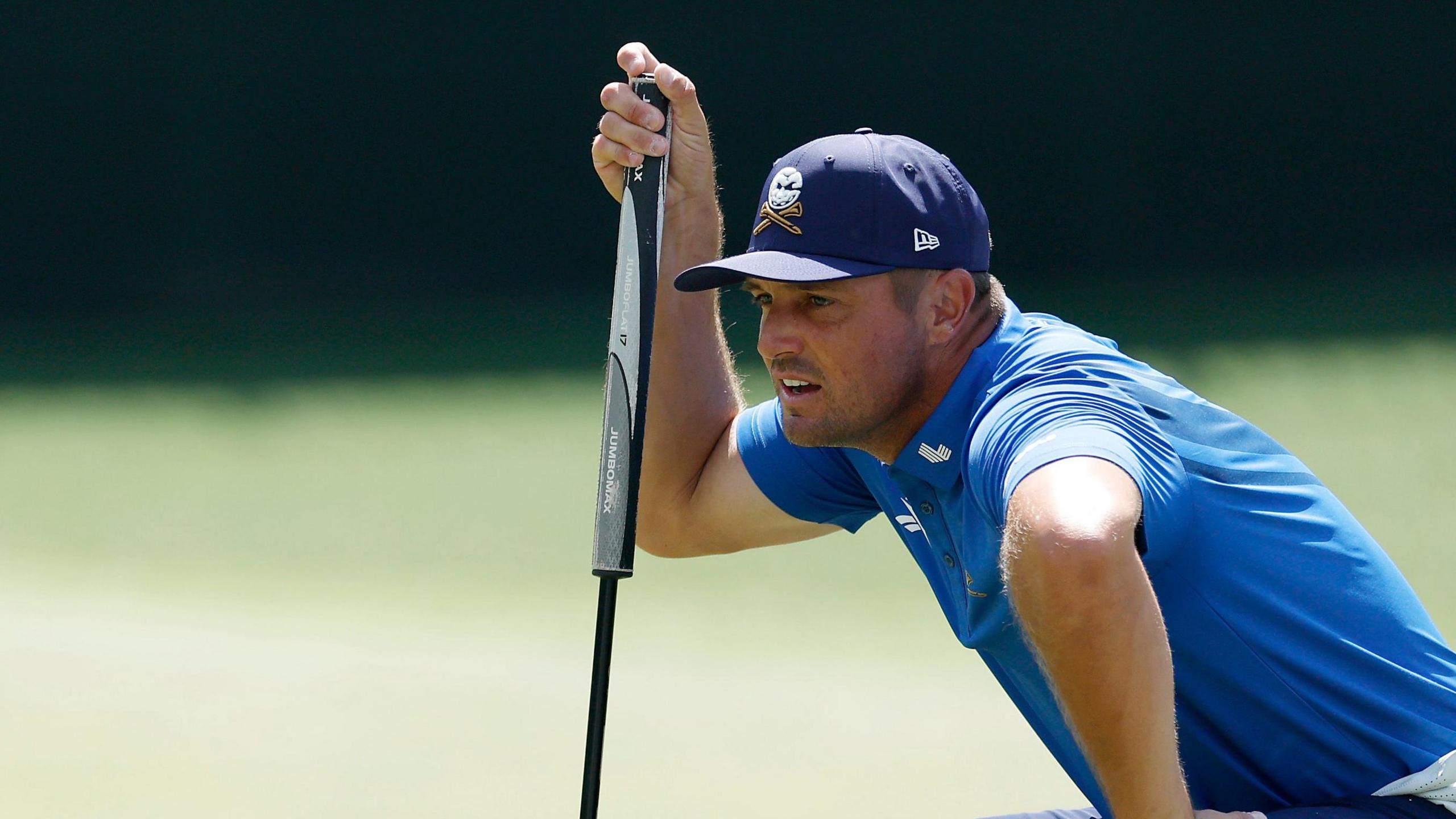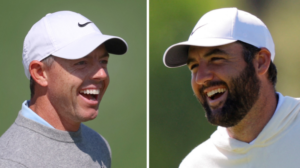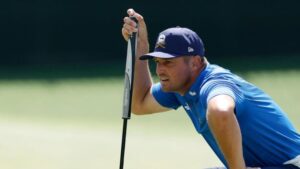Contenders ready – McIlroy, Rose & DeChambeau’s weekend Masters plan
Rory McIlroy, Justin Rose and Bryson DeChambeau know winning the Green Jacket on Sunday depends on what happens between their ears.

This video can not be played
To play this video you need to enable JavaScript in your browser.
Masters second-round leaderboard
-8 J Rose (Eng); -7 B DeChambeau (US); -6 C Conners (Can), R McIlroy (NI); -5 M McCarty (US), S Lowry (Ire), S Scheffler (US), T Hatton (Eng)
Selected others: -3 L Aberg (Swe), C Morikawa (US); -2 T Fleetwood (Eng); Level M Fitzpatrick (Eng), A Rai (Eng); +2 J Rahm (Spa); D Willett (Eng)
Whatever Augusta founder Bobby Jones uttered about the importance of golfing mentality – there are a few variants of his profound psychology – the legendary American probably didn’t expect it to be referenced a century later.
But Jones’ principle of the most crucial hole for a golfer being the space between the ears remains commonly true.
Three of the leading Masters contenders going into the weekend – Justin Rose, Rory McIlroy and Bryson DeChambeau – understand the deep value of controlling the mind.
What differs is how each player manages those thoughts in order to best execute their technical skills.
The approaches of the three men currently at the top of the leaderboard will be a fascinating aspect of the battle for the Green Jacket.
Of course, there is no guarantee any of them will succeed.
World number one and defending champion Scottie Scheffler looms ominously, with the likes of Canada’s Corey Conners (three top-10s in his past six Masters), Ireland’s 2019 Open champion Shane Lowry and England’s Tyrrell Hatton also lurking on a stacked leaderboard.
English veteran Rose, winner of the 2013 US Open and 2016 Olympic gold medal, is the man they are all chasing.
The 36-hole leader is one clear of DeChambeau on eight under and his approach was to switch off from golf after a short debrief following his second round.
He felt spending time with his family – including his mum and wife – instead of conducting further analysis would help his mental recovery.
“Energy management is key going into a big weekend,” the 44-year-old said.
“I haven’t made a full plan yet, but I won’t watch every round. I feel I’ve done that before and I think that’s as emotionally draining as being out there practising all afternoon.
“I’ve got the family here, which is nice. I don’t know what we’ll do, but I won’t be sweating it.”
-
-
16 hours ago
-
Northern Ireland’s McIlroy, who is two shots behind Rose after bouncing back into contention on Friday, is also using family life as a way to compartmentalise his day at work.
For the second time at a major inside the past year, McIlroy made a hasty exit after two double bogeys ruined his Augusta scorecard on Thursday.
But, unlike his final-day collapse at the US Open in June, McIlroy had the opportunity to come back the following day and put things right.
“Once I left the [Augusta] property [on Thursday], I just tried to leave what had happened here,” the 35-year-old explained after a superb second-round 66.
“I rushed out of here to get home to see [daughter] Poppy before she went to bed. So that was nice to get to see her before she went to sleep.
“I guess that’s something that I didn’t have a few years ago, to be able to get home and take my mind off the golf a little bit.”
This video can not be played
To play this video you need to enable JavaScript in your browser.
The burden of expectation weighs heavier on McIlroy than his European Ryder Cup team-mate Rose.
Both men are chasing a Green Jacket which has been tantalising close, but just agonisingly out of reach, in respective careers which have delivered so much success.
Four-time major winner McIlroy, however, has the intense scrutiny of trying to claim a rare career Grand Slam – which he has been attempting to complete since 2015.
The world number two has been working with renowned sports psychologist Bob Rotella for a number of years and has been consulting the American between rounds at Augusta National.
McIlroy said their discussions enabled him to climb back into contention on Friday after a chastening end to his opening round.
“I feel like I did a good job of resetting,” said McIlroy, who went out in 35 before returning in 31.
“I had a good conversation with Bob, mostly around not pushing too hard too early and trying to get those shots back straight away.
“I just tried to stay really, really patient.”

While Rose and McIlroy are trying to switch off more, DeChambeau seemingly does the opposite.
The man known as ‘The Scientist’ for his studious thinking continues to leave no stone unturned in his pursuit of the iconic Green Jacket.
The 31-year-old American, who took advantage of McIlroy’s demise to win last year’s US Open, has thumped thousands of balls on the practice range this week – hitting considerably more than his rivals – and says he plays “ping pong paddle” in his mind with different swings thoughts.
“I’ve got a lot going on up in there,” laughed the two-time US Open champion, who went straight to the driving range after his round on Friday.
So for this week, it is working. DeChambeau backed up an opening 69 with a 68 to place himself between Rose and McIlroy on seven under par going into the weekend.
He talks about staying “present”. Like McIlroy, who claims he has learned to accept “golfing heartbreak”, DeChambeau also says that can be helped by understanding the past.
“You have to put yourself in position,” the LIV Series golfer said.
“You have to fail. You have to lose. You have to win. You have to come from behind. You have to hold the lead.
“All those expectations and feelings have to get conquered in your mind. That’s why this game is played between your ears.”
Just like Jones – the winner of his era’s original Grand Slam in 1930 – told us.
Follow live text commentary and in-play clips of Saturday’s third round on the BBC Sport website and app from 18:30 BST, with radio commentary from19:30 BST on 5 Sports Extra and 21:00 on 5 Live and BBC Sounds.








